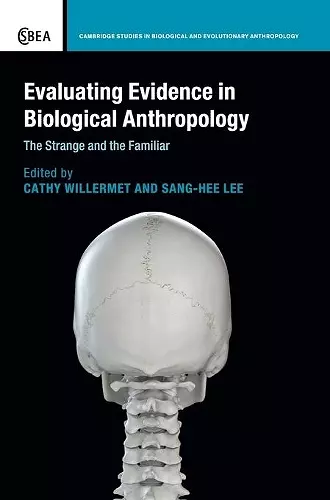Evaluating Evidence in Biological Anthropology
The Strange and the Familiar
Cathy Willermet editor Sang-Hee Lee editor
Format:Hardback
Publisher:Cambridge University Press
Published:14th Nov '19
Currently unavailable, and unfortunately no date known when it will be back

A critical assessment of how evidence in biological anthropology is discovered, collected and interpreted.
Taking a critical perspective to the field, this book challenges how evidence in biological anthropology is discovered, collected and interpreted. It encourages researchers and students in anthropology and related disciplines to de-familiarize themselves from well-known methods and develop novel, multidisciplinary approaches.Biological anthropology is a diverse field, with countless research methods and techniques in different sub-disciplines. This book takes a critical perspective to the current state of the field, exploring theory and practice in paleoanthropology, bioarchaeology, and ecology. Contributors challenge how evidence is discovered, collected and interpreted, and explain that researchers gain insights by de-familiarizing themselves from well-known methods and taking a different perspective - 'making the familiar strange'. The book covers how researchers' biases and assumptions affect the interpretation of topics such as human evolution and population movements; race, health, and disability; bodies and embodiment; and landscapes and ecology. A final chapter includes a critical assessment of new thinking about technology, in addition to the multilayered and complex nature of both research questions and evidence. This is an insightful text for researchers and graduate students in anthropology, biology, ecology, history and philosophy of science.
'This edited volume critically examines how practitioners of biological anthropology apply methods, interpret evidence, and produce established knowledge … The opening five chapters are dedicated to theoretical and philosophical issues. Some themes have been discussed for decades, such as how women are portrayed in evolution and how popular science mischaracterizes human evolution, while others are newly emerging, such as the question of why insects are not eaten more widely on a global scale. The last five chapters present new approaches to data analysis and methods. These include contributions on disability and care in paleopathology, the osteological paradox in bioarchaeology, the incompleteness of fossil evidence, and the application of stable isotope studies for interpreting past environments.' T. Harrison, Choice
ISBN: 9781108476843
Dimensions: 252mm x 178mm x 15mm
Weight: 590g
228 pages